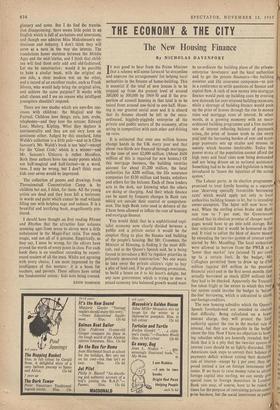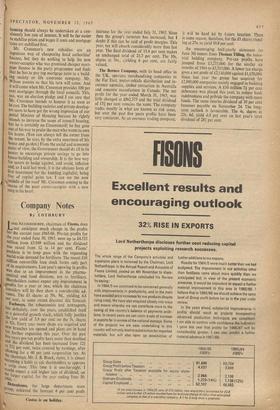THE ECONOMY & THE CITY
The New Housing Finance
By NICHOLAS DAVENPORT
T was good to hear from the Prime Minister I that a scheme will come forward 'to streamline and improve the arrangements' for helping local authorities in the finance of house-building. This is essential if the total of new houses is to be stepped up from the present level of around 380,000 to 500,000 by 1969-70 and if the pro- portion of council housing in that total is to be raised from around one-third to one-half. Hous- ing is our greatest social asset and it is absurd that its finance should be left to the unco- ordinated, higgledy-piggledy enterprise of the private and public sectors of the economy, often acting in competition with each other and driving up rates.
It is estimated that over one million houses change hands in the UK every year and that about two-thirds are financed through mortgages to the tune of over £2,000 million. (About £600 million of this is required for new houses.) Of this mortgage business, the building societies account for about £1,200 million, the local authorities for £200 million, the life assurance companies for £130 million and banks, solicitors and others for the balance. Each of these lenders acts in the dark, not knowing what the others are doing or charging. And their whole finance can be upset by frequent changes in Bank rate which are outside their control or comprehen- sion. The high Bank rates used in defence of the £ have been allowed to inflate the cost of housing and mortgage finance.
You would think that in a sophisticated capi- talist economy now clearly divided between a public and a private sector it would be the simplest thing to plan the finance and building of the people's housing. But Mr. Crossman, the Minister of Housing, is finding it the most diffi- cult, and as the Queen's Speech said, he is being forced to introduce a Bill `to regulate priorities in privately sponsored construction.' No one wants to take away the private citizen's right to buy a plot of land and, if he gets planning permission, to build a house on it to his heart's delight, but any sane government which is trying to steer a mixed economy into balanced growth would want
to co-ordinate the building plans of the private- enterprise 'developers' and the local authorities and to get the private financiers—the building societies and life assurance companies—to join in a conference to settle questions of finance and capital flow. A rush of new money into mortgage finance would push up building costs by creating new demands for over-strained building resources, while a shortage of building finance would push up the price of houses through the rise in money rates and mortgage rates of interest. In other words, in a growing economy with an unco- ordinated building programme and a free market rate of interest reflecting balance of payments crises, the price of houses tends to rise every year and the increasing burden of rent and mort- gage payments sets up strains and stresses in society which become intolerable. Today the poorer strata of the population cannot afford the high rents and local rates now being demanded and are being driven on to national assistance. Something had to be done and legislation is being introduced to 'lessen the injustices of the rating system.'
The Labour party, in its election programme, promised to treat family housing as a separate case 'deserving specially favourable borrowing rates' which would apply not only to local authorities building houses to let, but to intending owner-occupiers. The latter will now have to wait. When the sterling crises broke and Bank rate rose to 7 per cent, the Government realised that its election promise of cheaper mort- gages would have to go into cold storage. But they reiterated that it would be honoured in the end. It tried to soften the blow of dearer money by extending the two-tier system of interest rates started by Mr. Maudling. The local authorities were allowed to borrow from the PWLB at s `lower than market' rate (around 5f per cent) up to a certain limit. In the budget, Mr. Callaghan permitted them to draw up to £360 million (against £65 million in the previous financial year) and in the first seven months they actually borrowed so much (£269 million) that they had to be checked. Apparently the Treasury has taken fright at the extent to which this two tier system could involve the budget in 'below` the-line' borrowing, which is calculated to alarrn our foreign creditors.
The new housing subsidies which the Queen's Speech foreshadowed are intended to obviate
that difficulty. Being calculated on a lower, interest charge, they will protect the local
authority against the rise in the market rate of interest, but they are chargeable in the budget above the line. Now I have no objection to hoes'
ing subsidies which are honestly revealed, but 1 think that it is a pity that the two-tier system 01 interest rates should be so lightly discarded. The, Americans took steps to correct their balance 01 payments deficit without raising their domestic, rate of interest--except by 2 per cent; they posed instead a tax on foreign investment and issues. If we have to raise money rates to attraCl foreign capital into sterling, we can surely give' special rates to foreign depositors in Londoil, Bank rate may, of course, have to be raised at times for the purpose of restraining private-enter: prise business, but the social investment in publ0,
housing should always be undertaken at a con- sistently low rate of interest. It will be far easier to stabilise prices and wages if rents and mortgage rates are stabilised first.
Mr. Crossman's new subsidies are an ingenious way of cheapening local authorities' finance, but they do nothing to help the new owner-occupier who was promised cheaper mort- gage finance in the party programme and finds that he has to pay top mortgage rates to a build- ing society or life assurance company. Mr. Wilson assures us that his turn will come. And it will come when Mr. Crossman provides 100 per cent mortgages through the local councils. This, too, was an election pledge and I am sure that Mr. Crossman intends to honour it as soon as he can. The building societies and private develop- ers seem to have got the wrong impression of our genial Minister of Housing because he rightly intends to increase the scope of council housing, but he is certainly no Communard; he has gone out of his way to praise the man who wants to own his house. (You can always tell the owner from the tenant, he says, by the extra smartness of his house and garden.) From the social and economic Point of view, the Government should do all in its Power to encourage private savings to go into house-building and ownership. It is the best way for savers to hedge against, and avoid, inflation and, as I said last week, it is the obvious form of first investment for the budding capitalist, being free of capital gains tax. I can see the now 'middle of the road' Mr. Crossman coming to the rescue of the poor owner-occupier with a new















































 Previous page
Previous page